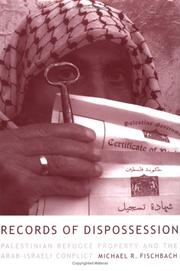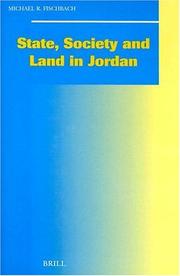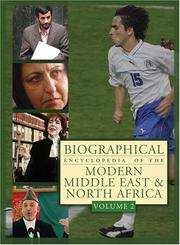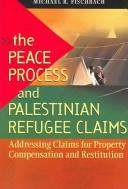| Listing 1 - 9 of 9 |
Sort by
|
Book
ISBN: 9780231503402 Year: 2003 Publisher: New York, NY
Abstract | Keywords | Export | Availability | Bookmark
 Loading...
Loading...Choose an application
- Reference Manager
- EndNote
- RefWorks (Direct export to RefWorks)

ISBN: 0231129785 132235295X 0231503407 Year: 2003 Publisher: New York, N.Y. Columbia University Press
Abstract | Keywords | Export | Availability | Bookmark
 Loading...
Loading...Choose an application
- Reference Manager
- EndNote
- RefWorks (Direct export to RefWorks)
No issue in the Arab-Israeli conflict has proven more intractable than the status of the Palestinian refugees. This work focuses on the controversial question of the property left behind by the refugees during the first Arab-Israeli war in 1948. Beyond discussing the extent of the refugees' losses and detailing the methods by which Israel expropriated this property, the book also notes the ways that the property question has affected, and in turn been affected by, the wider Arab-Israeli conflict over the decades. It shows how the property question influenced Arab-Israeli diplomacy and discusses the implications of the fact that the question remains unresolved despite numerous diplomatic efforts.From late 1947 through 1948, more than 726,000 Palestinians-over half the entire population-were uprooted from their homes and villages. Though some middle class refugees were able to flee with liquid capital, the majority were small-scale farmers whose worldly fortunes were the land, livestock, and crops they left behind. This book tells for the first time the full story of how much property changed hands, what it was worth, and how it was used by the fledgling state of Israel. It then traces the subsequent decades of diplomatic activity on the issue and publishes previously secret UN estimates of the scope and value of the refugee property. Michael Fischbach offers a detailed study of Israeli counterclaims for Jewish property lost in the Arab world, diplomatic schemes for resolving the conflict, secret compensation efforts, and the renewed diplomatic efforts on behalf of property claims since the onset of Arab-Israeli peace talks.Based largely on archival records, including those of the United Nations Conciliation Commission of Palestine, never before available to the public and kept under lock and key in the UN archives, Records of Dispossession is the first detailed historical examination of the Palestinian refugee property question.
Arab-Israeli conflict --- Refugee property --- Palestinian Arabs --- Diplomatic negotiations in international disputes --- Conflit israélo-arabe --- Biens des réfugiés --- Palestiniens --- Négociations diplomatiques dans les conflits internationaux --- Claims --- Réclamations --- United Nations. --- Négociations diplomatiques dans les conflits internationauxClaims --- RéclamationsUnited Nations. --- Conflit israélo-arabe --- Biens des réfugiés --- Négociations diplomatiques dans les conflits internationaux --- Réclamations --- Migration. Refugees --- Peaceful settlement of international disputes --- Law of real property --- International relations. Foreign policy --- anno 1940-1949 --- anno 1960-1969 --- anno 1950-1959 --- Israel --- Palestine --- Diplomatic negotiations in international disputes. --- Claims. --- Negotiations in international disputes --- Pacific settlement of international disputes --- Arab Palestinians --- Arabs --- Arabs in Palestine --- Palestinians --- Ethnology --- Abandonment of property --- Alien property --- Confiscations --- Property --- Israel-Arab conflicts --- Israel-Palestine conflict --- Israeli-Arab conflict --- Israeli-Palestinian conflict --- Jewish-Arab relations --- Palestine-Israel conflict --- Palestine problem (1948- ) --- Palestinian-Israeli conflict --- Law and legislation --- History --- Foreign property --- Palestine question (1948-)

ISBN: 9004119124 9786610464470 1417536802 128046447X 9047400623 9781417536801 9789047400622 6610464472 9789004119123 Year: 2000 Publisher: Leiden Boston Brill
Abstract | Keywords | Export | Availability | Bookmark
 Loading...
Loading...Choose an application
- Reference Manager
- EndNote
- RefWorks (Direct export to RefWorks)
Examines how state and society conceptualized land ownership in Jordan from the late Ottoman era through the 1950's, and how the resulting interaction between them shaped the socio-economic and political contours of modern Jordan.
Land tenure. --- Land tenure - Jordan - History - 19th century. --- Land use. --- Land value taxation. --- Land tenure --- Land use --- Land value taxation --- History --- Land tax --- Taxation of land values --- Land --- Land utilization --- Use of land --- Utilization of land --- Agrarian tenure --- Feudal tenure --- Freehold --- Land ownership --- Land question --- Landownership --- Tenure of land --- Taxation --- Real property tax --- Single tax --- Economics --- Land cover --- Landscape assessment --- NIMBY syndrome --- Land use, Rural --- Real property --- Land, Nationalization of --- Landowners --- Serfdom
Book
ISBN: 1503607399 9781503607392 9781503605459 9781503607385 1503605450 1503607380 Year: 2019 Publisher: Stanford, Calif. Stanford University Press
Abstract | Keywords | Export | Availability | Bookmark
 Loading...
Loading...Choose an application
- Reference Manager
- EndNote
- RefWorks (Direct export to RefWorks)
The 1967 Arab–Israeli War rocketed the question of Israel and Palestine onto the front pages of American newspapers. Black Power activists saw Palestinians as a kindred people of color, waging the same struggle for freedom and justice as themselves. Soon concerns over the Arab–Israeli conflict spread across mainstream black politics and into the heart of the civil rights movement itself. Black Power and Palestine uncovers why so many African Americans—notably Martin Luther King, Jr., Malcolm X, and Muhammad Ali, among others—came to support the Palestinians or felt the need to respond to those who did. Americans first heard pro-Palestinian sentiments in public through the black freedom struggle of the 1960s and 1970s. Michael R. Fischbach uncovers this hidden history of the Arab–Israeli conflict's role in African American activism and the ways that distant struggle shaped the domestic fight for racial equality. Black Power's transnational connections between African Americans and Palestinians deeply affected U.S. black politics, animating black visions of identity well into the late 1970s. Black Power and Palestine allows those black voices to be heard again today. In chronicling this story, Fischbach reveals much about how American peoples of color create political strategies, a sense of self, and a place within U.S. and global communities. The shadow cast by events of the 1960s and 1970s continues to affect the United States in deep, structural ways. This is the first book to explore how conflict in the Middle East shaped the American civil rights movement.
Civil rights movements --- African American civil rights workers --- Arab-Israeli conflict --- Public opinion --- Black power --- Israel-Arab conflicts --- Israel-Palestine conflict --- Israeli-Arab conflict --- Israeli-Palestinian conflict --- Jewish-Arab relations --- Palestine-Israel conflict --- Palestine problem (1948- ) --- Palestinian-Israeli conflict --- Palestinian Arabs --- Afro-American civil rights workers --- Civil rights workers, African American --- Civil rights workers --- History --- Attitudes. --- Foreign public opinion, American. --- Influence. --- National movements --- anno 1960-1969 --- anno 1970-1979 --- Palestine --- United States --- United States of America
Book
ISBN: 9780231135382 9780231517812 Year: 2008 Publisher: New York, N.Y. Columbia University Press
Abstract | Keywords | Export | Availability | Bookmark
 Loading...
Loading...Choose an application
- Reference Manager
- EndNote
- RefWorks (Direct export to RefWorks)
International relations. Foreign policy --- Peaceful settlement of international disputes --- Law of real property --- anno 1940-1949 --- anno 1950-1959 --- anno 1960-1969 --- Arab states --- Israel

ISBN: 1414418884 1414418892 Year: 2008 Publisher: Detroit, Mich. Gale
Abstract | Keywords | Export | Availability | Bookmark
 Loading...
Loading...Choose an application
- Reference Manager
- EndNote
- RefWorks (Direct export to RefWorks)

ISBN: 1929223803 Year: 2006 Publisher: Washington, D.C. : United States Institute of Peace Press,
Abstract | Keywords | Export | Availability | Bookmark
 Loading...
Loading...Choose an application
- Reference Manager
- EndNote
- RefWorks (Direct export to RefWorks)
Palestinian Arabs --- Arab-Israeli conflict --- Refugee property --- Palestiniens --- Conflit israélo-arabe --- Biens des réfugiés --- Claims. --- Claims. --- Réclamations --- Réclamations
Book
ISBN: 9781503611078 1503611078 9781503610446 Year: 2019 Publisher: Stanford, California
Abstract | Keywords | Export | Availability | Bookmark
 Loading...
Loading...Choose an application
- Reference Manager
- EndNote
- RefWorks (Direct export to RefWorks)
The Arab-Israeli conflict constituted a serious problem for the American Left in the 1960s: pro-Palestinian activists hailed the Palestinian struggle against Israel as part of a fundamental restructuring of the global imperialist order, while pro-Israeli leftists held a less revolutionary worldview that understood Israel as a paragon of democratic socialist virtue. This intra-left debate was in part doctrinal, in part generational. But further woven into this split were sometimes agonizing questions of identity. Jews were disproportionately well-represented in the Movement, and their personal and communal lives could deeply affect their stances vis-à-vis the Middle East.The Movement and the Middle East offers the first assessment of the controversial and ultimately debilitating role of the Arab-Israeli conflict among left-wing activists during a turbulent period of American history. Michael R. Fischbach draws on a deep well of original sources—from personal interviews to declassified FBI and CIA documents—to present a story of the left-wing responses to the question of Palestine and Israel. He shows how, as the 1970s wore on, the cleavages emerging within the American Left widened, weakening the Movement and leaving a lasting impact that still affects progressive American politics today.
Arab-Israeli conflict --- New Left --- Foreign public opinion, American --- History --- Israel --- Foreign public opinion, American. --- 1960s. --- Arab-Israeli conflict. --- Jews. --- New Left. --- Old Left. --- anti-Vietnam War movement. --- left-wing parties. --- radical politics. --- student movement. --- women’s movement.
Book

ISBN: 9780812299915 Year: 2021 Publisher: Philadelphia
Abstract | Keywords | Export | Availability | Bookmark
 Loading...
Loading...Choose an application
- Reference Manager
- EndNote
- RefWorks (Direct export to RefWorks)
| Listing 1 - 9 of 9 |
Sort by
|

 Search
Search Feedback
Feedback About UniCat
About UniCat  Help
Help News
News